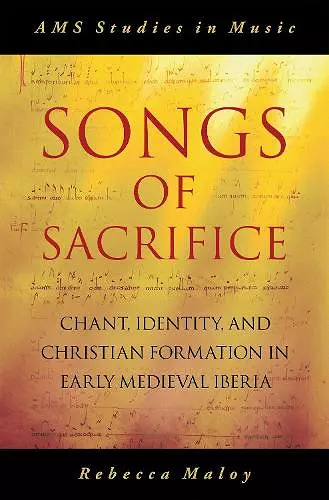Songs of Sacrifice
Chant, Identity, and Christian Formation in Early Medieval Iberia
Format:Hardback
Publisher:Oxford University Press Inc
Published:21st Jul '20
Currently unavailable, and unfortunately no date known when it will be back

Between the seventh and eleventh centuries, Christian worship on the Iberian Peninsula was structured by rituals of great theological and musical richness, known as the Old Hispanic (or Mozarabic) rite. Much of this liturgy was produced during a seventh-century cultural and educational program aimed at creating a society unified in the Nicene faith, built on twin pillars of church and kingdom. Led by Isidore of Seville and subsequent generations of bishops, this cultural renewal effort began with a project of clerical education, facilitated through a distinctive culture of textual production. Rebecca Maloy's Songs of Sacrifice argues that liturgical music--both texts and melodies--played a central role in the cultural renewal of early Medieval Iberia, with a chant repertory that was carefully designed to promote the goals of this cultural renewal. Through extensive reworking of the Old Testament, the creators of the chant texts fashioned scripture in ways designed to teach biblical exegesis, linking both to patristic traditions--distilled through the works of Isidore of Seville and other Iberian bishops--and to Visigothic anti-Jewish discourse. Through musical rhetoric, the melodies shaped the delivery of the texts to underline these messages. In these ways, the chants worked toward the formation of individual Christian souls and a communal Nicene identity. Examining the crucial influence of these chants, Songs of Sacrifice addresses a plethora of long-debated issues in musicology, history, and liturgical studies, and reveals the potential for Old Hispanic chant to shed light on fundamental questions about how early chant repertories were formed, why their creators selected particular passages of scripture, and why they set them to certain kinds of music.
Maloy succeeds in significantly advancing current understanding of plainchant in the Hispanic rite and of its relationship with other plainchant repertoires. This book is a good example of how the apparent disadvantage of the Hispanic rite's chants nonspecific pitch notation can lead to analysis of melodic, textual, and liturgical variables often overlooked in plainchant studies but which render invaluable information about early music (within and beyond Hispania). * Raquel Rojo Carrillo, University of Cambridge, Early Medieval Europe *
This book should be read by everyone interested in the early history of Latin liturgical chant and not only by specialists in the Old Hispanic Chant. It situates chant at the very center of the Western Church's great exegetical enterprise and not merely as an ornament on the liturgy. It adds extremely rich detail to the view that words and music actually have something meaningful to do with one another in this repertory, a view that has often been doubted. And it does all of this on the basis of detailed analysis and extraordinary mastery of sources and bibliography. * Don Michael Randel, Professor of Music Emeritus, University of Chicago *
Songs of Sacrificewill help to transform understandings of the religious culture of Visigothic Iberia. It demonstrates convincingly how the theological and pastoral writings of bishops found expression in the liturgy as part of a concerted effort to make a truly orthodox Christian society. * Jamie Wood, University of Lincoln *
ISBN: 9780190071530
Dimensions: 160mm x 236mm x 33mm
Weight: 703g
344 pages